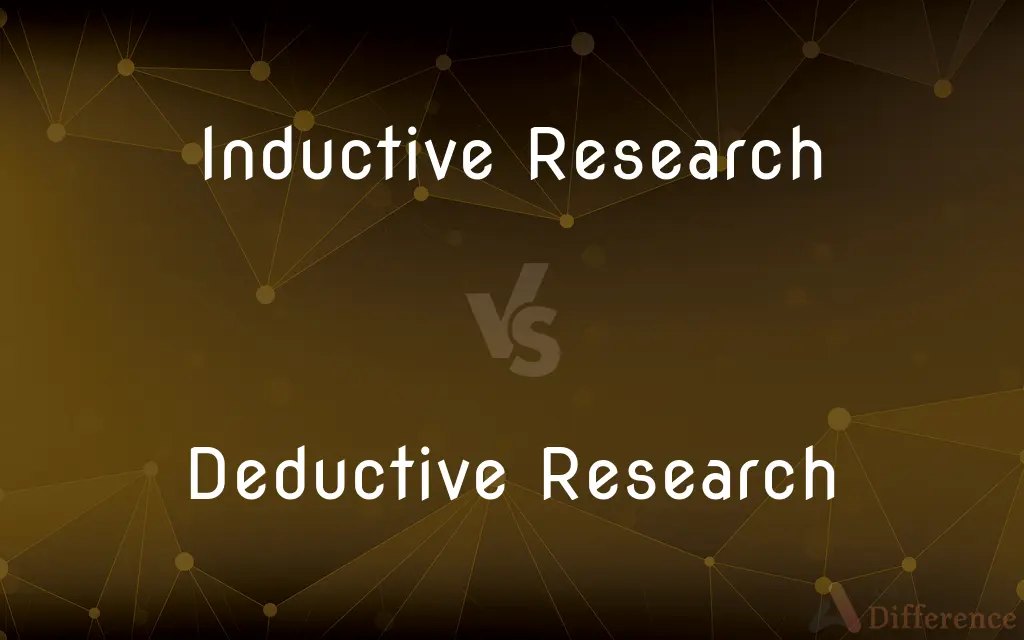Inductive Research vs. Deductive Research — What's the Difference?
By Tayyaba Rehman — Published on January 14, 2024
Inductive Research involves forming theories based on observed patterns, while Deductive Research tests existing theories through structured experimentation.

Difference Between Inductive Research and Deductive Research
Table of Contents
ADVERTISEMENT
Key Differences
Approach and Methodology: Inductive Research is an approach where researchers observe specific instances and then draw general conclusions or theories based on these observations. It starts with specific observations and moves towards broader generalizations. Deductive Research, in contrast, begins with a general theory or hypothesis and then conducts experiments or observations to test the theory.
Data Collection and Analysis: In Inductive Research, data collection is often qualitative, focusing on understanding human experiences, behaviors, or interactions. This approach is exploratory and open-ended. Deductive Research typically involves quantitative methods, using statistical analysis to test hypotheses and evaluate the relationship between variables.
Theory Development and Testing: Inductive Research is instrumental in developing new theories, as it involves building up theories from observed patterns or behaviors. Deductive Research is used for testing existing theories or hypotheses to confirm or refute them.
Flexibility and Structure: Inductive Research is more flexible, allowing for changes in research focus based on emerging data. Deductive Research is more structured, with a specific plan and approach designed to test a pre-defined hypothesis or theory.
Outcome and Application: The outcome of Inductive Research often leads to the generation of new ideas or theories, while Deductive Research seeks to provide conclusive results that validate or invalidate existing theories. Inductive is common in social sciences, whereas Deductive is prevalent in natural sciences.
ADVERTISEMENT
Comparison Chart
Starting Point
Specific observations.
General theory or hypothesis.
Data Collection
Qualitative, exploratory.
Quantitative, structured.
Purpose
Theory development.
Theory testing.
Approach
Flexible, open-ended.
Structured, fixed.
Outcome
Generates new theories.
Validates or refutes theories.
Compare with Definitions
Inductive Research
It’s commonly used in social sciences to explore human experiences.
Inductive research in anthropology provided insights into tribal customs.
Deductive Research
Deductive Research seeks conclusive results to confirm theories.
A deductive approach was used in validating pharmaceutical drug effects.
Inductive Research
Inductive Research is flexible, adapting to emerging data.
In researching urban development, new trends adjusted the initial focus of the inductive study.
Deductive Research
It starts with a hypothesis and uses quantitative methods for testing.
A deductive study used statistical analysis to test economic models.
Inductive Research
Inductive Research develops theories based on specific observations.
Observing patient behaviors led to new theories in clinical psychology through inductive research.
Deductive Research
Deductive Research is structured with a specific research plan.
Deductive research on chemical reactions followed a predefined experimental procedure.
Inductive Research
It involves qualitative data to understand patterns or behaviors.
An inductive study on cultural practices helped understand societal norms.
Deductive Research
Commonly used in natural sciences to validate theories.
In biology, deductive research tested genetic inheritance theories.
Inductive Research
Inductive Research often leads to the generation of new ideas.
Observations in classrooms led to innovative educational theories through inductive research.
Deductive Research
Deductive Research tests existing theories through structured experiments.
Deductive research was used to test the theory of relativity in physics.
Common Curiosities
What is Inductive Research?
Forming general theories based on specific observations.
Can Inductive Research use quantitative methods?
It’s rare but possible, depending on the research design.
In which fields is Inductive Research commonly used?
Often in social sciences and humanities.
What is a key advantage of Inductive Research?
Its flexibility and adaptability to emerging data.
What is Deductive Research?
Testing existing theories through structured experimentation.
Where is Deductive Research prevalent?
Mainly in natural sciences and formal sciences.
Does Deductive Research require a hypothesis?
Yes, it typically starts with a hypothesis or theory.
Can theories from Inductive Research be tested deductively?
Absolutely, this is a common practice in research.
Is Deductive Research always quantitative?
Predominantly, although it can incorporate qualitative aspects.
How does Deductive Research analyze data?
Using statistical or logical analysis to test hypotheses.
What is a major benefit of Deductive Research?
Its ability to provide conclusive, empirical evidence.
Can Inductive Research lead to hypothesis formation?
Yes, it often leads to new hypotheses or theories.
Is Deductive Research more structured than Inductive?
Yes, it follows a more rigid and predefined structure.
How is data analyzed in Inductive Research?
Through qualitative analysis, looking for patterns or themes.
Is Inductive Research open-ended?
Yes, it’s exploratory and open to changing directions.
Share Your Discovery

Previous Comparison
Zucchini vs. Green Squash
Next Comparison
Linear search vs. Binary searchAuthor Spotlight
Written by
Tayyaba RehmanTayyaba Rehman is a distinguished writer, currently serving as a primary contributor to askdifference.com. As a researcher in semantics and etymology, Tayyaba's passion for the complexity of languages and their distinctions has found a perfect home on the platform. Tayyaba delves into the intricacies of language, distinguishing between commonly confused words and phrases, thereby providing clarity for readers worldwide.
















































